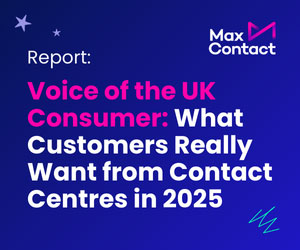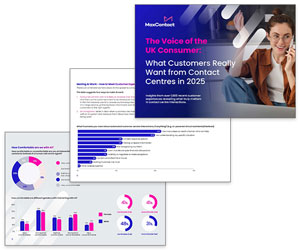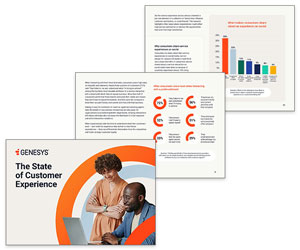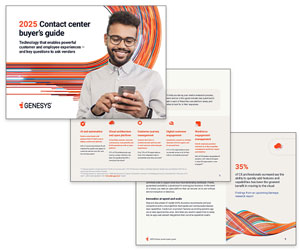Our panel explains what you should be doing to fully understand the customers coming through your contact centre.
Focus on the entire customer journey rather than quick-fire surveys
The voice of the customer needs to be about the whole customer interaction journey.
It needs to go beyond NetPromoter Scores and quick-fire surveys run at the end of calls – as these can be subjective and are impacted much more by the ultimate result of the call rather than the quality of the agent’s performance.
The voice of the customer is about bringing together real-time feedback and incorporating customer surveys. However, it also extends to real-time speech analytics, delivering real-time monitoring and coaching of all calls between agents and customers for compliance and quality assurance purposes.
It’s also about proactively addressing issues by providing agents with real-time feedback, enabling them to work alongside their managers and wider customer service teams to make the necessary adjustments.

Jeremy Payne
Place equal focus on voice, email, webchat and social media
The focus should also be on more than vocal communications. The multichannel demands of customers today are driving businesses to focus on capturing interaction across all customer engagement platforms.
Therefore we are equally interested in emails, webchat, social media posts, and all aspects of traditional and digital customer communications.
This enables us to review the whole engagement from input to output and at the same time assess behavioural patterns in order to more easily identify broken processes.
With thanks to Jeremy Payne at Enghouse Interactive
Get customers to opt in to the survey before the service is delivered
Timing is everything, so a good basic guideline is to get the customer to opt in to the survey before the service is delivered.
For post-call survey technology, the application is most useful if it is provided by the same vendor that provides the ACD and call recording system, as the company can then correlate the call, the recording, and the survey.

Dave Paulding
Give an immediate response to any customer submitting a poor rating
Implement a system for an immediate response for any survey where the customer has given a poor grade.
Real-time response capabilities mean customers could be contacted within minutes to resolve the dissatisfaction.
Businesses who don’t measure or react quickly simply pay the price of customers deserting them and making their next purchase elsewhere.
With thanks to Dave Paulding at Interactive Intelligence
Make sure you have the full support of the people in charge of the budget
A successful VoC programme will require resource and support from the top down in the organisation.
It’s important to have the full support of executive stakeholders and key decision makers who can provide the energy and budget to drive the delivery.
Roll out your VoC programme to all areas with customer contact
The programme should be integrated across all areas that have customer contact, providing tactical and strategic insight to the business.
It’s not just the preserve of the contact centre, the success relies on including all departments where customer feedback is relevant and can contribute to mapping the customer journey.
Interaction analytics can enable a fuller picture of the customer experience
The use of interaction analytics can help provide insight and context for the customer experience.
Analytics provides the ability to drill down quickly to root cause and, if linked to feedback surveys and quality monitoring scenarios, it enables a fuller picture of the customer experience.

David Evans
Agree on what is being measured and set clear objectives
Make sure at the outset there is agreement on what is being measured and how the insight is going to be used to drive change.
Without focus and clear objectives, it will be difficult to sustain momentum.
Also don’t waste time on areas that don’t drive business benefits or are difficult to measure. Ensure at the outset the VoC is captured to baseline the current customer sentiment, so any initiatives can be tracked and benefits measured.
You should also make the results visible to everyone to help engage all of your employees in the VoC programme.
With thanks to David Evans at Business Systems
An after-call survey is less intrusive than phoning back later on
Allowing the customer to complete a survey at the end of their call – for example, rate your experience 1-5 – is far less intrusive than calling them back later or emailing them.
It also has the side benefit of alerting the call centre manager to problems in real time and allowing a customer to vent any negative response direct to you, rather than on a less controllable public site.
Surveys tied to the relevant conversations are easier to track
Tying the call to the survey allows for easier tracking of responses to individual agents and can provide an objective basis to reward agents for good services.
Surveys should also be short (no one wants to unnecessarily try the patience of their customers) and crafted to the nature of the business conducted to make them relevant across the board.
For example, a helpline might have different questions from a sales line.
With thanks to Simon Beeching at Syntec

Ashley Williamson
Get to the root cause of problems before they escalate
Surveys sent days or weeks after the interaction has taken place will provide limited value, as customer memories fade and experiences with other companies can dilute feedback.
Capturing insight in real time means you can respond to customer complaints immediately and get to the root cause of problems before they escalate.
With thanks to Ashley Williamson at Bright UK
Provide agents with access to what your customers are saying
Make sure your voice of the customer insight can be broken down to agent and team level.
Providing agents with access to what your customers are saying can be an incredibly useful tool and allows individuals to take ownership of their own development.
By breaking down insight across the organisation, a company can quickly establish which individuals need the most help. The very best agents can be celebrated, while those that need extra training can be given further support.

Simon Thorpe
Align games and incentives with customer feedback
Games, incentives and performance management can also be aligned with customer feedback, allowing a company to develop a credible improvement programme.
By capturing regular customer feedback at an agent level, Quality Assurance prep time can also be reduced.
Quality teams can focus their attention on the interactions that have been scored poorly, allowing them to spend more time listening to the problem calls rather than selecting a random sample each month.
With thanks to Simon Thorpe at Gold Standard
Check your systems aren’t hindering the customer experience

Carolyn Blunt
Ensure advisors understand what the VoC programme means for them. Exactly how do they tune in to the customer and personalise experience? Do systems (especially CRM) assist or hinder this? Can they see full customer history? Are they empowered to be flexible, to fix or compensate?
Without this training, structure, clarity and front-line action, many VoC programmes become just a fad or buzzword.
The investment in the technology and the clear decisions in process and policy can make or break your VoC success.
Listen to your agents when they raise customer issues
Agents will have lots of feedback on the root causes of customer issues that need to be listened to and swiftly fixed. No excuses.
A ‘you said, we did’ feedback loop is essential to keep the front line confident that they can do what is best for each customer.
With thanks to Carolyn Blunt at Real Results Training
Don’t start without executive sponsorship and service recovery design

Lee Mostari
As you embark on your VoC programme, the two most important factors to start with are executive sponsorship and service recovery design.
Executive sponsorship is important as you want your VoC programme to have visibility, buy-in and support from the very top.
This will help you get priority and resources to drive change.
Service recovery is important as you will have customers identified as at risk of leaving your organisation and they need immediate action.
This is also the fastest way to demonstrate a return-on-investment for your new VoC programme.
With thanks to Lee Mostari at NICE Systems
Use IVR notifications to prepare customers for a survey
IVR notifications at the start of a call can help prepare customers for a survey.

Keith Wilkinson
Agents can then remind them of this after the query has been resolved, leaving the customer to give feedback using their keypad or via a recorded message.
Real-time reports indicate how well the business is doing
Real-time reports let contact centre managers know how well they are doing in delivering an optimised customer experience, allowing them to adapt accordingly.
Customer feedback also gives the wider business feedback about other service components such as products and fees.
With thanks to Keith Wilkinson at Genesys
Combine call recording and quality monitoring tools with customer surveys

David Ford
In order to develop a well-rounded VoC programme, combine call recording and quality monitoring tools with customer surveys.
Validate your own internal scoring and coaching methodology with post-contact customer feedback. Incorporate social media monitoring too, as this can sometimes give a more honest and unbiased view.
Also track your brand mentions using monitoring software and factor this into your reporting.
With thanks to David Ford at Magnetic North
Be clear about what you want to get from your VoC programme
Be specific about desired outcomes. It might sound obvious, but it’s amazing how many VoC programmes fail in this respect – leaving businesses with noise without context.
- Include short-term and long-term goals.
- Make sure you know what change you want to bring about and what you are specifically looking for.
- Set out long-term and medium-term reactions to customer experiences and how you’re going to use this insight to adapt your programme.
- Put in place triggers for certain keywords so that you can get in touch with customers following negative feedback.
Make sure that your sample size is representative of your customer base
Make sure that your sample size is representative of your customer base and is capturing the feelings of most people.
Don’t be blinded by knee-jerk reactions and remember that not all channels are suitable for every purpose.
Look for trends, consistency, or perhaps inconsistency, and identify areas where you can build stronger relationships with your customers.
Reward agents for factors which they have real control over
If a customer has fed back about an individual agent, make sure that is shared with the agent concerned as soon as possible, when things go right as well as when they go wrong.
Also make sure agents are rewarded for factors over which they have a real influence.
Listen to and act on what your agents and customers say

Jaime Scott
The biggest cause of so-called ‘survey fatigue’ is consumer cynicism. How would you feel about giving feedback over and over again if nothing ever changes?
Make sure customers know that this is not just a tick-box exercise, and be honest.
The same is true for agents who deal with feedback knowing full well they have no influence over the outcome.
Maybe you can’t change everything, but you can listen and act on the information you are given.
With thanks to Jaime Scott at EvaluAgent
What have you done to capture the Voice of the Customer (VoC) in your contact centre?
Author: Megan Jones
Published On: 11th Mar 2015 - Last modified: 13th Jan 2025
Read more about - Technology, Bright, Business Systems, Carolyn Blunt, David Ford, Editor's Picks, Enghouse Interactive, EvaluAgent, Genesys, Intrado, Jeremy Payne, NICE, Rob Wilkinson, Syntec, Voice of the Customer





















